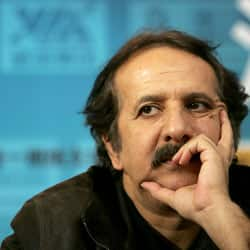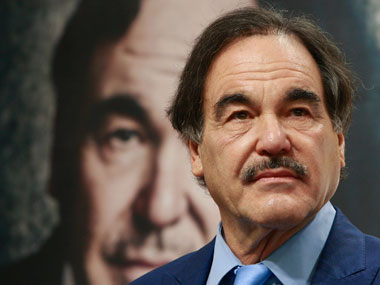By Vikram Phukan A round-up of what eight celebrated international directors have to say about Indian cinema. Some of these opinions have been stated during interactions with Indian journalists, who are ever eager to get the lowdown on anything and everything desi, including our cinema. That’s the stock question that provides good copy (or at least a headline of some import) to the local press, but which visiting filmmakers must secretly dread, given the general quality of our celluloid output. Of course, there is no reason to believe that the directors featured here are being less than candid. [caption id=“attachment_70504” align=“alignleft” width=“380” caption=“Oliver Stone. Getty Images”]
 [/caption] Oliver Stone “Indian cinema is very prolific. I can’t keep up. I used that vitality in Natural Born Killers. I love that the films switch from comedy to romance and then to tragedy. I love that. I had studied Indian filmmaker Satyajit Ray’s works in school. I would make a movie in India if there was a great story. If I had Danny Boyle’s luck, I’d make Slumdog Millionaire. There was a good detective story written two years ago but… I shot parts of Alexander in the Ladakh region. It was beautiful.” — BBC News [caption id=“attachment_70505” align=“alignleft” width=“250” caption=“Danny Boyle. Getty Images”]
[/caption] Oliver Stone “Indian cinema is very prolific. I can’t keep up. I used that vitality in Natural Born Killers. I love that the films switch from comedy to romance and then to tragedy. I love that. I had studied Indian filmmaker Satyajit Ray’s works in school. I would make a movie in India if there was a great story. If I had Danny Boyle’s luck, I’d make Slumdog Millionaire. There was a good detective story written two years ago but… I shot parts of Alexander in the Ladakh region. It was beautiful.” — BBC News [caption id=“attachment_70505” align=“alignleft” width=“250” caption=“Danny Boyle. Getty Images”]
 [/caption] Danny Boyle “…then there’s the Bollywood films, and they are a great mixture of some amazing sequences and some things that you find very difficult to tolerate because your custom is so different, when you’re watching them. Because of the length of them and the song and dance in them, and the standards of some bits of it are — you find them a bit lacking. There’s some wonderful stuff, though, to watch. Really inventive stuff, within a kind of mess sometimes. It’s just India, that. Their movies are fantastical, kind of like ridiculous things, and the life on the street is brutal in one sense, and yet the two sit together. That’s the whole point. So you’re infected by that.” — SFPG [caption id=“attachment_70508” align=“alignleft” width=“250” caption=“Quentin Tarantino. Getty Images”]
[/caption] Danny Boyle “…then there’s the Bollywood films, and they are a great mixture of some amazing sequences and some things that you find very difficult to tolerate because your custom is so different, when you’re watching them. Because of the length of them and the song and dance in them, and the standards of some bits of it are — you find them a bit lacking. There’s some wonderful stuff, though, to watch. Really inventive stuff, within a kind of mess sometimes. It’s just India, that. Their movies are fantastical, kind of like ridiculous things, and the life on the street is brutal in one sense, and yet the two sit together. That’s the whole point. So you’re infected by that.” — SFPG [caption id=“attachment_70508” align=“alignleft” width=“250” caption=“Quentin Tarantino. Getty Images”]
 [/caption] Quentin Tarantino “I think it was fabulous. Of the many rip-offs (of Reservoir Dogs) I loved Hong Kong’s Too Many Ways To Be No.1 and this one, Kaante. The best part is, you have Indian guys coming to the US and looting a US bank. How cool is that! I was truly honored. And these guys are played by the legends of Bollywood. Here I am, watching a film that I’ve directed and then it goes into each character’s background. And I’m like, ‘Whoa’. For, I always write backgrounds and stuff and it always gets chopped off during the edit. And so I was amazed on seeing this. I felt, this isn’t Reservoir Dogs. But then it goes into the warehouse scene and I am like, ‘Wow it’s back to Reservoir Dogs’. Isn’t it amazing!” — PFC [caption id=“attachment_70509” align=“alignleft” width=“250” caption=“Martin Scorcese. Getty Images”]
[/caption] Quentin Tarantino “I think it was fabulous. Of the many rip-offs (of Reservoir Dogs) I loved Hong Kong’s Too Many Ways To Be No.1 and this one, Kaante. The best part is, you have Indian guys coming to the US and looting a US bank. How cool is that! I was truly honored. And these guys are played by the legends of Bollywood. Here I am, watching a film that I’ve directed and then it goes into each character’s background. And I’m like, ‘Whoa’. For, I always write backgrounds and stuff and it always gets chopped off during the edit. And so I was amazed on seeing this. I felt, this isn’t Reservoir Dogs. But then it goes into the warehouse scene and I am like, ‘Wow it’s back to Reservoir Dogs’. Isn’t it amazing!” — PFC [caption id=“attachment_70509” align=“alignleft” width=“250” caption=“Martin Scorcese. Getty Images”]
 [/caption] Martin Scorcese “Yes, I watch the Indian news on Sunday morning. I see cuts from Hindi movies. I don’t understand them because they don’t have subtitles. But I do understand that cinema is a fantasy, the way Hollywood cinema was in the 1930s during the Depression when everyone wanted to see musicals. But when I was about 15, experiencing The Apu Trilogy together—to see all three films as I did, five-and-a-half hours straight—was really like reaching over to the other side of the world. It was so different from our cultural setup in New York. You can’t deny the power of these stories. And it seems very simple, but it’s very hard to shoot.” — Span [caption id=“attachment_70511” align=“alignleft” width=“250” caption=“M Night Shyamalan. Getty Images”]
[/caption] Martin Scorcese “Yes, I watch the Indian news on Sunday morning. I see cuts from Hindi movies. I don’t understand them because they don’t have subtitles. But I do understand that cinema is a fantasy, the way Hollywood cinema was in the 1930s during the Depression when everyone wanted to see musicals. But when I was about 15, experiencing The Apu Trilogy together—to see all three films as I did, five-and-a-half hours straight—was really like reaching over to the other side of the world. It was so different from our cultural setup in New York. You can’t deny the power of these stories. And it seems very simple, but it’s very hard to shoot.” — Span [caption id=“attachment_70511” align=“alignleft” width=“250” caption=“M Night Shyamalan. Getty Images”]
 [/caption] M Night Shyamalan “I think it is a very powerful art form. I find it very powerful, that heightened vocabulary — the push-in [close up] on a character, then another push-in and another push-in and the music is going into overdrive, and the character is telling the wife get out of my house, and she is screaming, and running out of the house, and this heightened thing, it’s powerful. At first you giggle when you start to watch it but then, you get acclimated to that vocabulary and you start feeling the same sort of heightened emotions.” —Rediff [caption id=“attachment_70512” align=“alignleft” width=“250” caption=“Baz Luhrmann. Getty Images”]
[/caption] M Night Shyamalan “I think it is a very powerful art form. I find it very powerful, that heightened vocabulary — the push-in [close up] on a character, then another push-in and another push-in and the music is going into overdrive, and the character is telling the wife get out of my house, and she is screaming, and running out of the house, and this heightened thing, it’s powerful. At first you giggle when you start to watch it but then, you get acclimated to that vocabulary and you start feeling the same sort of heightened emotions.” —Rediff [caption id=“attachment_70512” align=“alignleft” width=“250” caption=“Baz Luhrmann. Getty Images”]
 [/caption] Baz Luhrmann “My wife and I went to India to work on Midsummer Night’s Dream. We went out one night and there was a big poster up for a Bollywood movie. I said, ‘Let’s go see that.’ We did—2,000 audience members, high comedy, high tragedy, brother kills brother, [they] break out in some musical numbers, all jumbled up together in 4 hours of Hindi. We thought that was amazing. So our question was, ‘Could we create a cinematic form like that? Could a musical work?’ A musical must be able to work in western culture again, and could it be comic-tragic? So then began this commitment of moving toward Moulin Rouge.” —About.com [caption id=“attachment_70513” align=“alignleft” width=“250” caption=“Majid Majidi. Getty Images”]
[/caption] Baz Luhrmann “My wife and I went to India to work on Midsummer Night’s Dream. We went out one night and there was a big poster up for a Bollywood movie. I said, ‘Let’s go see that.’ We did—2,000 audience members, high comedy, high tragedy, brother kills brother, [they] break out in some musical numbers, all jumbled up together in 4 hours of Hindi. We thought that was amazing. So our question was, ‘Could we create a cinematic form like that? Could a musical work?’ A musical must be able to work in western culture again, and could it be comic-tragic? So then began this commitment of moving toward Moulin Rouge.” —About.com [caption id=“attachment_70513” align=“alignleft” width=“250” caption=“Majid Majidi. Getty Images”]
 [/caption] Majid Majidi “Indian cinema is in a very sad situation. They haven’t been able to come up with the standards to be accepted by the world. They are not using their faculties, economic or cultural. There are potentially good actors here. Indians have a wide viewer base. Indian cinema has access to lots of money. I am therefore saddened that the outcome of quality cinema from such an industry is zero. An industry producing 600 films should produce at least 40-50 films of international standards at least. But clearly this isn’t the case.” — Mumbai Mirror The writer of this piece runs the theatre appreciation website Stage Impressions. Read the original version of this post on
Film Impressions
.
[/caption] Majid Majidi “Indian cinema is in a very sad situation. They haven’t been able to come up with the standards to be accepted by the world. They are not using their faculties, economic or cultural. There are potentially good actors here. Indians have a wide viewer base. Indian cinema has access to lots of money. I am therefore saddened that the outcome of quality cinema from such an industry is zero. An industry producing 600 films should produce at least 40-50 films of international standards at least. But clearly this isn’t the case.” — Mumbai Mirror The writer of this piece runs the theatre appreciation website Stage Impressions. Read the original version of this post on
Film Impressions
.
Why FILM IMPRESSIONS? Because we believe film lovers deserve better. The quality of film criticism in India has been steadily deteriorating, losing its credibility and intellectual rigour. Instead of informed and unbiased opinion we have been subjected to publicity-driven writing, often manipulated by vested interests. We wish to offer well-argued criticism, insightful interviews, historical perspective... and celebrate cinema in all its glory
)